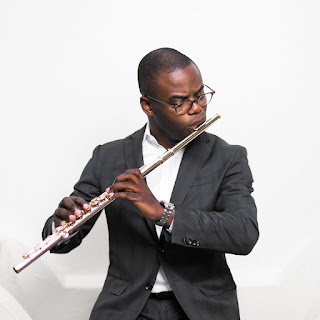Seductive flute concerto sets up ICO's concise postcard tour
 |
| Demarre McGill: nimble articulation, expressive warmth |
The music of Kevin Puts has had some standout displays in recent years, both in Indianapolis and not so far away. Saturday night it was the turn of his Flute Concerto, as the Indianapolis Chamber Orchestra welcomed Demarre McGill as guest artist for a concert labeled "Musical Postcard."
The label had plural resonance, because the idea seemed to be to hop around the globe to a few places where regionally characteristic music emerged and has been celebrated by classical composers. Matthew Kraemer put together a charming program of works by Gyorgy Ligeti (whose centennial year has occasioned a burst of representation in concert schedules), Manuel de Falla, and Miguel del Aguila.
To sum up the Puts history in the region: Cincinnati Opera mounted an emotionally engaging production of his "Silent Night," romantically built upon a famous spontaneous truce between foes along First World War front lines at Christmas 1914. The Indianapolis Symphony Orchestra co-commissioned "Silent Night Elegy," performed in 2019 near the end of what turned out to be Krzysztof Urbanski's last full season as music director. And that performance was close enough to "Letters from Georgia," which graced the gala opening night of the 2017-18 season and featured superstar soprano Renee Fleming in an interpretation of some correspondence from Georgia O'Keeffe.
Clearly, an affinity for rendering human character through music helps distinguish Kevin Puts. And though there's no programmatic content in this concerto, showcases of this sort encourage the listener to attribute revelations of personality to the treatment of the solo instrument. McGill seemed always apt to project this in a performance well-coordinated by Kraemer.
The long orchestral tutti at the start draws upon the most familiar Aaron Copland style, his individually fashioned woodland and prairie Americana. Once the solo instrument enters, such reminiscences move into the background. The flute cadenza is rich in demands that must sound natural and flowing. McGill achieved this effect: The tone remained full, the phrases well-supported.
These pluses remained, through the pretty slow movement (in tribute to Mozart, too literal for my taste) and got splendidly displayed in the finale. Woodblock and xylophone immediately lend a crisp energy to the music; then slower middle episodes, with melody taking over from rhythm, yielded to a surprising, final Latinesque drive, featuring in accompaniment a tricky hand-clapping pattern for just about everyone in the orchestra who was not playing. Admiration and delight emerged, joined at the hip till the end.
Apart from a somewhat tentative final note of the first movement, McGill exemplified the steady virtues of superb breath control and a warmth of expression that suffused even the fast passages. Nothing breathy or simply dashed off (which solo violinists can get away with) was to be heard. Whenever I want to reacquaint myself with an unaccompanied instrumental recording (excepting the piano, of course), I turn either to the Bach cello suites and violin sonatas and partitas or to Jean-Pierre Rampal's old LP of a dozen Telemann flute fantasies. McGill's performance Saturday was pretty much at that level of security, fullness and agility. For an encore, he offered a piece written for him by James Lee III, "Principal Brothers No.1," which exhibited the same virtues in a customized setting.
The concert opened with the first suite the Spanish composer Falla drew from "The Three-Cornered Hat," his cheeky score for Sergei Diaghilev's pantomime. Some of the less familiar excerpts are in this suite, which also draws upon the pastel coloration of Falla's roughly contemporary quasi-piano-concerto, "Nights in the Gardens of Spain." The performance handsomely set up expectations for the quirkiness and ensemble novelties of the well-chosen program.
After intermission came "Salon Buenos Aires," Aguila's evocation of vernacular Argentina, with extensive celebrations of the tango and the piquant use of bitonality here and there. That called to mind what Darius Milhaud also did, more aggressively, superimposing tonal centers with Brazilian folk music in "Saudades do Brazil." There was also a captivating use of two horns in dialogue, offstage and on-, to crown the piece. The mysteries suggested by the second movement's title "Tango to Dream" came through cleverly in some string-strumming by the pianist, the string sections in delicate tremolos, and the inevitably ethereal harp and celesta.
An early example of the resourcefulness of the Hungarian composer Ligeti concluded the concert. Only hinting at the sound explorations that were to make his art internationally famous among the concert music included in "2001: A Space Odyssey," this piece shows a fresh interpretation of folk-music sources, with sometimes abrupt changes of texture and tempo. All of it seemed to be well in hand as the ICO continues to make a virtuoso impression, thanks to the variety and balance of its concerts under the music director's sure guiding hand.



Comments
Post a Comment